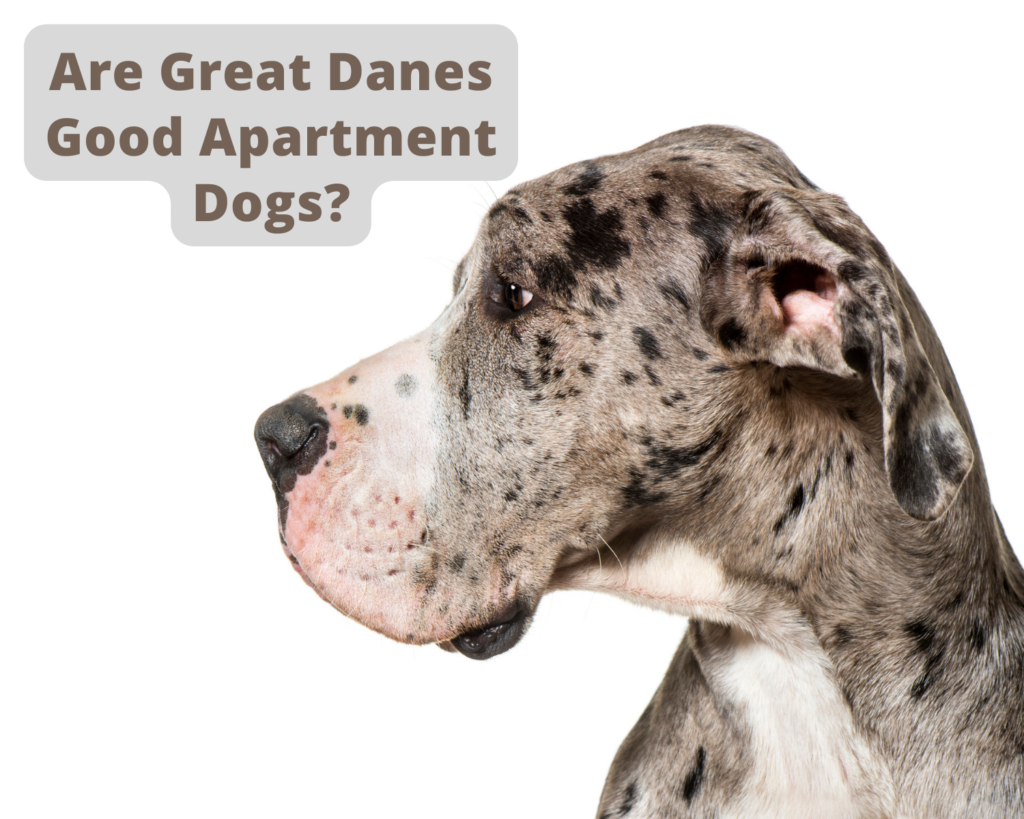Living in an apartment poses some challenges to aspiring dog parents. There’s a lack of space, a close living situation with neighbors, and many other issues to consider.
For dogs like Great Danes, there are a lot of concerns to keep in mind when it comes to apartment living.
Are Great Danes good apartment dogs? Read on to find out.
Are Great Danes Good Apartment Dogs?
Believe it or not, Great Danes are considered surprisingly good apartment dogs. Despite their large size, their low energy and friendly personalities have made them popular for small homes. They’ve ranked highly among suitable apartment dogs and are calm, peaceful, and even-tempered.
Of course, it’s worth noting that this depends a lot on the individual dog and your personal capabilities, time, and resources, so keep that in mind!
Reasons Why A Great Dane May Not Be The Best Apartment Dog
1. Small Living Space
The biggest concern for a Great Dane in an apartment is the small living space. Most apartments have much less space than a landed home or even a larger condominium. Great Danes are very large dogs!
The breed standard height of Great Danes, according to the American Kennel Club, is just under 3 feet.
This means that a “standing” Great Dane, or one on its back paws, could easily reach 7 feet in height. Basically, they take up a lot of space.
Great Danes don’t care a lot about small spaces, as they like curling up to relax or rest. But the space that their body takes up can still make the apartment feel quite congested for all its inhabitants.
A careless Great Dane may also bump into furniture and items due to a lack of wiggle room.
2. Insufficient Outdoor Space
Apartments aren’t exactly known for their outdoor spaces. You might have a little balcony, but that’s hardly enough for a Great Dane.
Great Danes are fairly low energy, but like all dogs, they still do need time spent outdoors to burn off energy and manage restlessness.
Without that outdoor space, Great Danes can feel restricted. If your lifestyle doesn’t support regularly bringing a dog outdoors, Great Danes might not be the best choice.
3. Destructive Behavior
Great Danes are famously very calm, but as with all dogs, they need enough exercise to prevent poor behavior. This is especially important for larger breeds.
Destructive behavior because of an under-exercised Great Dane will be much more chaotic, expensive, and dangerous than destructive behavior by a much smaller dog.
4. Boredom
Great Danes have average intelligence and are very patient, which means they don’t get bored too easily. But all dogs still have needs for engagement, and it’s hard to stay entertained in an apartment.
Without access to the outdoors or visible objects of interest outside, Great Danes can become listless and bored. This can cause some degree of depression or may result in poor behavior.
5. Barking and Howling
Great Danes are incredibly noisy dogs. They’re very communicative and will talk in a series of barks pretty much all of the time.
They bark when they’re bored, hungry, want anything at all, or see anything that catches their eye.
Worse still, these barks are extremely loud and are well-known for being very frightening. In an apartment, these barks will echo and disturb your neighbors.
All in all, it’ll be less than ideal for those in the units next door.
But that’s not the only cause of noise issues with a Great Dane. These dogs also love to howl in their big, booming voices.
It’s yet another means of communication and can signal anxiety, sickness, injury, a desire for attention, or just the need to talk. It can also be an instinctual response to other noises.
It’s pretty easy to see that howling and barking can be a bad quality for an apartment dog. It’s trainable, but it takes a lot of effort to ensure that these tendencies are kept to a minimum.
Tips For Making Apartment Life Easier With A Great Dane
1. Provide Outdoor Exercise
Great Danes, like most dogs, need to spend some time exercising outdoors. You need to bring your Great Dane out of the apartment and down to a nice, natural area.
This could be a dog park, beach, or other open space where it’s safe for your dog to play, run, and explore.

Great Danes require about two or three sessions of outdoor exercise per day. They’re lazier than many other dog breeds, but that doesn’t mean they don’t need physical activity.
A 30 to 45-minute walk twice daily – once in the morning and once in the evening – can burn off excess energy and ensure a happy, calm, apartment-suited dog.
2. Do Lots Of Training
There’s a lot of training involved with any apartment dog. You have to be considerate of your neighbors and mindful of the decreased space.
This is why Great Danes must be properly trained to reliably be a good fit for an apartment living situation.
Training will be necessary to avoid excessive howling and barking for the sake of your neighbors. You’ll also have to train the dog to not react too excitedly to people knocking on your door and ringing the doorbell.
This is especially true if you receive delivery items often. A calm dog is a reliable and good neighbor!
3. Crate Train
Crate training should be done for any dog regardless of breed, but for big dogs that will be living in small spaces, it’s extra necessary.
Great Danes will need to learn to temper their energy, respect and recognize boundaries, and have their own comfortable space.
Crate training will require a large enough crate and a set of inviting, soft, and comfortable bedding and toys. Make sure it’s as welcoming and cozy as possible so your Great Dane will feel truly happy in there.
In an apartment, the crate should be placed in an area where you will spend a lot of your time. Your dog will slowly grow to enjoy being in a crate, and when you need to leave the apartment for a short while, a Great Dane can be safely and happily confined.
4. Use Mental Exercises
Boredom can cause poor behavior in Great Danes and may prompt a lot of barking and howling.
Mental exercises can help to keep a Great Dane occupied so that it doesn’t feel restless and resort to non-preferred methods for entertaining itself.
Great Danes have average intelligence and can do simple, easy mental exercises. You can use purchased puzzle toys that are stuffed with treats to occupy them and get their problem-solving skills moving.
If you have more time and attention to devote, you can try games like hide-and-seek and treasure hunting. All that matters is that your Great Dane’s intelligence is being challenged!
5. Hire Dog Walkers Or Sitters
If you don’t have the time or energy to ensure the very best behavior from your Great Dane, you could need some extra help.
Hire a dog walker to bring your dog out for the necessary exercise that they need. Or hire a sitter to keep your dog in check when you’re out and away from the apartment.
Or, perhaps, send your dog to proper training classes for some extra help in controlling barking and howling!
Breed Restrictions And Great Danes
Breed restrictions are a serious concern for many dog owners out there, and for good reason.
Different cities, counties, and states in the United States have different laws and rules for certain dog breeds. Great Danes feature on many lists of restricted breeds, which can pose a big problem for those who want to bring them into an apartment.
Great Danes are very commonly found on lists of restricted breeds. A mix of local legislation, property management rules, and insurance companies have various restrictions on Great Danes.
These restrictions are often present due to the sheer size of Great Danes. Even though they’re patient and calm, on the rare off-chance that a Great Dane is provoked to aggression, its large size spells trouble for anyone in its path.
Great Danes are also intimidating, which can frighten smaller dogs and lead to fights.
It’s a good idea to check your local legislation for rules on breed restrictions to see if Great Danes are restricted.
If you’re feeling optimistic, you can set up a pet interview to attempt to get your Great Dane un-blacklisted from an apartment building.
Conclusion
Great Danes are known for being surprisingly good apartment dogs, but due to their noise levels, size, and their status as a restricted breed in many locations, they may not be suitable for an apartment.
Find out what you can about your local laws and consider your unique dog and situation before deciding on your next steps.

